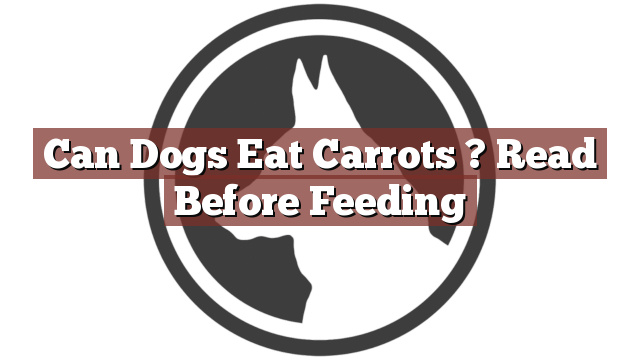Understanding Your Dog’s Dietary Needs
As a responsible dog owner, it is essential to understand your furry friend’s dietary needs. A well-balanced diet plays a crucial role in maintaining your dog’s overall health and well-being. While dogs are primarily carnivorous animals, their bodies are capable of digesting a variety of fruits and vegetables. However, it is vital to ensure that any addition to their diet is safe and beneficial for them.
Can Dogs Eat Carrots? Read Before Feeding
Can dogs eat carrots? The answer is a resounding yes. Carrots are not only safe for dogs to consume but can also provide a range of health benefits. Packed with essential vitamins and minerals, carrots are a nutritious addition to your dog’s diet. They are an excellent source of vitamin A, which promotes healthy vision, immune function, and cell growth. Additionally, carrots contain fiber, which aids in digestive health and can help prevent constipation.
However, it is essential to note that while carrots are generally safe for dogs, they should be given in moderation. Too many carrots can lead to an upset stomach or gastrointestinal issues. It is always recommended to introduce any new food gradually and observe your dog for any adverse reactions. If your dog has any existing health conditions or dietary restrictions, it is best to consult with your veterinarian before adding carrots to their diet.
Pros and Cons of Feeding Carrots to Dogs
Feeding your dog carrots can have several benefits. The crunchy texture of carrots can help promote dental health by reducing plaque and tartar buildup. Chewing on carrots can also satisfy your dog’s natural urge to chew, reducing the likelihood of them chewing on other items in your home. Additionally, the high fiber content in carrots can aid in weight management and promote a healthy digestive system.
On the other hand, there are a few considerations to keep in mind when feeding carrots to your dog. Carrots are relatively high in natural sugars, so it is crucial to feed them in moderation, especially for dogs with diabetes or weight issues. Additionally, some dogs may have difficulty digesting raw carrots, leading to digestive discomfort or an upset stomach. In such cases, cooking or steaming the carrots can help make them easier to digest.
Conclusion: Are Carrots a Healthy Addition to Your Dog’s Diet?
In conclusion, carrots can be a healthy addition to your dog’s diet. They are packed with essential nutrients and vitamins that can contribute to their overall well-being. However, it is crucial to feed carrots in moderation and consider your dog’s individual needs and health conditions. If you have any concerns or questions about incorporating carrots into your dog’s diet, consult with your veterinarian for personalized advice and recommendations. Remember, a balanced and well-rounded diet, along with regular exercise, is key to keeping your furry friend happy and healthy.
Thank you for taking the time to read through our exploration of [page_title]. As every dog lover knows, our furry friends have unique dietary needs and responses, often varying from one canine to another. This is why it's paramount to approach any changes in their diet with caution and knowledge.
Before introducing any new treats or making alterations to your dog's diet based on our insights, it's crucial to consult with a veterinarian about [page_title]. Their expertise ensures that the choices you make are well-suited to your particular pet's health and well-being.
Even seemingly harmless foods can sometimes lead to allergic reactions or digestive issues, which is why monitoring your dog after introducing any new food item is essential.
The content provided here on [page_title] is crafted with care, thorough research, and a genuine love for dogs. Nevertheless, it serves as a general guideline and should not be considered a substitute for professional veterinary advice.
Always prioritize the expert insights of your veterinarian, and remember that the health and happiness of your furry companion come first.
May your journey with your pet continue to be filled with joy, love, and safe culinary adventures. Happy reading, and even happier snacking for your canine friend!

